|
Rumney, Tuesdays and Saturdays;
to Canaan Street and Factory Vil-
lage, daily.
CANDIA.
Rockingham County. The
soil of Candia is hard of cultiva-
tion, but through the energy and
industry of the inhabitants, they
get a good return for their labor.
Scenery. The site of the town
is elevated and commands an ex-
tensive view of the rich scenery
of the adjacent country for many
miles around, including the White
hills, the Wachusetts, the lights
on Plum Island, and the ocean.
Rivers. Two branches of the
Lamprey River take their rise in
this town, and afford some water
power, which is generally im-
proved.
Employments. Farming is the
principal employment of the in-
habitants, there being many excel-
lent farms, from which much pro-
duce is raised which finds a ready
market in the city of Manchester.
Considerable manufacturing is
carried on, there being nearly two
hundred males and females em-
ployed in the various manufacto-
ries in town. Many are engaged
in making men and women’s
boots and shoes, there being over
300,000 pairs manufactured annu-
ally, for which the workmen re-
ceive for their labor, nearly $60,000.
Five thousand cases of stock are
brought from out of the State,
all prepared to be made into
shoes.
Resources. Annual productions
of the soil, valued at $117,413; an-
nual value of mechanical labor,
$60,200; deposits in savings banks,
$128,288; value of stocks, bonds,
and money at interest, $7,500; |
stock in trade, $9,200; professional
business, $10,000.
First Settlements. David Mc-
Clure came to Candia in 1743
or 1744, and William Turner,
John Sargent and others, came
here in 1748. It was formerly
called Charmingfare; the first vis-
itors being so well pleased with its
site, as a place of residence. The
town received its present name in
compliment to Governor Benning
Wentworth, who was once a pris-
oner on the island of Candia, in
the Mediteranean Sea.
First Ministers. Rev. David
Jewett settled in 1771; removed
in 1780. Rev Joseph Prince, or-
dained in 1782; removed in 1789
Rev. Jesse Remington, ordained
in 1790; died in 1815.
Boundaries. North by Deer-
field, east by Raymond, south by
Auburn and Chester, and west by
Hooksett. Area, 17,743 acres.
Distances. Eighteen miles south-
east from Concord, and about thir-
ty miles west from Portsmouth.
Railroad. The Concord and
Portsmouth Railroad.
CANTERBURY.
Merrimack County. There are
some very fine interval farms on
the Merrimack river, but further
back from the river the town is
uneven, the more hilly parts afford-
ing fine pasturage. The soil is
generally good, and produces fine
crops of corn, oats, potatoes, and
hay. Much attention, for the past
few years, has been given to agri-
culture, and some of the best prac-
tical farmers and producing farms
in the State, are to be found in
Canterbury.
Hills. There is a high ridge of
land extending along the line be- |
